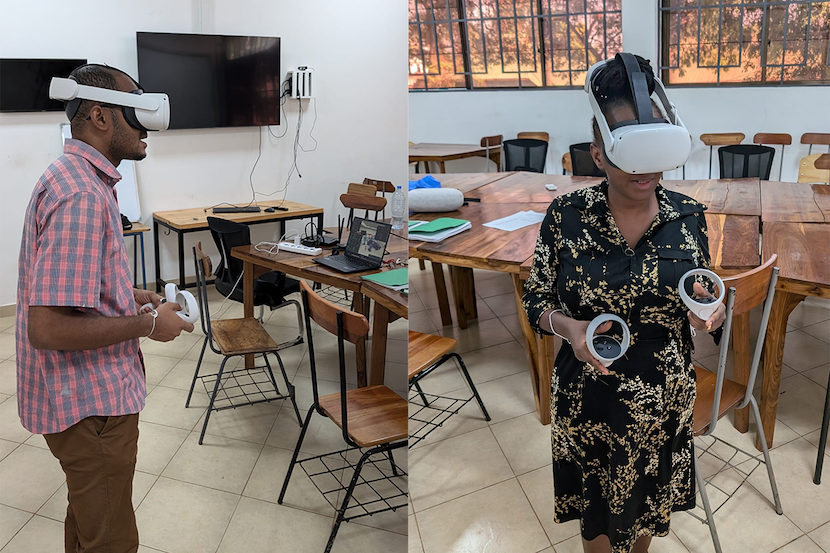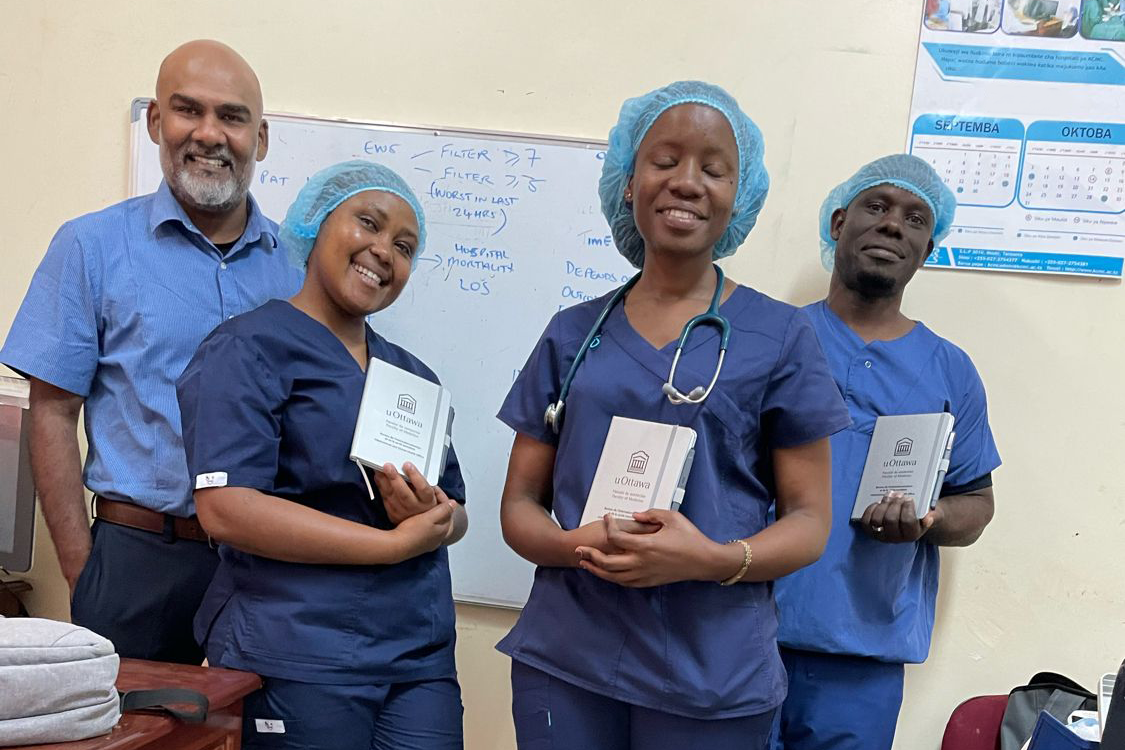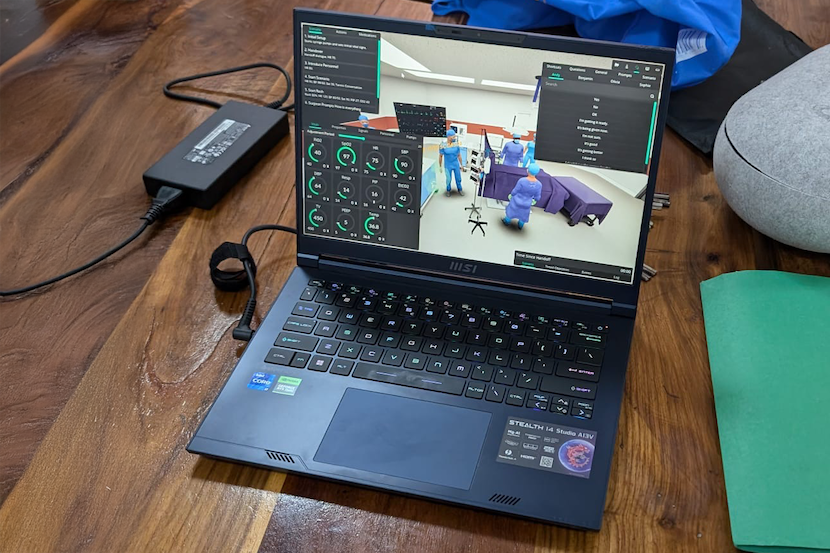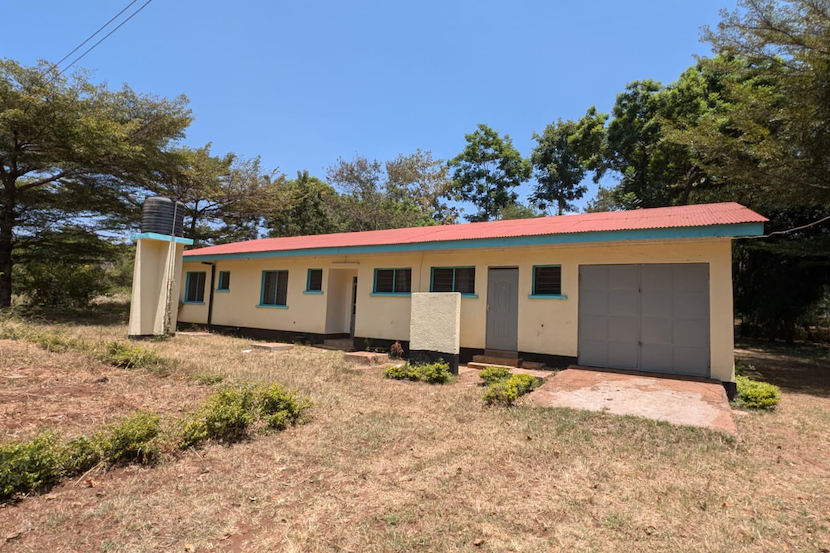In a medical emergency, doctors save lives through confident, split-second decisions. But that kind of confidence doesn't appear overnight. The question is: how can medical professionals gain that experience before they're in a real-life crisis?
That’s where Virtual Reality (VR) comes in. At the University of Ottawa, the power of VR is transforming how complex medical skills are taught, allowing students to master intricate medical skills within the safe confines of a classroom. Now, as part of its global health mandate, the university is sharing this cutting-edge training technology with partners around the world.
Resident doctors in Tanzania are the latest to benefit from the uOttawa Faculty of Medicine’s innovative learning tools, thanks to a partnership established in November 2021 between the Kilimanjaro Christian Medical University College (KCMUCo) and the Faculty of Medicine.

The partners’ mutual goal of strengthening health systems and reducing inequalities is opening up all kinds of opportunities to learners and professionals that they wouldn’t otherwise have.
VR simulation teaching a “new high”
Kilimanjaro Christian Medical Centre (KCMC) recently identified a need for capacity in the area of anesthesia; now, with its advances in novel learning tools, uOttawa has responded with its innovative, results-oriented training.

In February, Dr Elio Belfiore, assistant professor at the Faculty of Medicine and obstetrical anesthesiologist at The Ottawa Hospital, conducted virtual/immersive reality (VR/IR)-based simulation scenarios in anesthesiology, playing out simulated responses to emergencies.
For many learners, developing skills in a simulated environment is an opportunity they have never had before, says Dr. Wes Rajaleelan, assistant professor of surgery at the University of Ottawa Faculty of Medicine and staff anesthesiologist at The Ottawa Hospital.

And simulation-based training in anesthesiology, specifically in an emergency environment, is breaking new ground for the Faculty of Medicine, says Dr. Rajaleelan.
“This is a new high for all of us,” raves Dr. Rajaleelan, enthusiastic co-driver of the initiative that is bringing learning via VR headsets to medical learners around the world.
While VR is key in the knowledge sharing necessary for the improvement of medical care internationally, there’s even more happening when it comes to the two schools’ global health exchanges.
Committed to capacity-building initiatives
From the early days of the partnership, Dr. Rajaleelan has been a key player in the Faculty’s commitment to meaningful capacity-building initiatives with Tanzania.
Soon after initially helping define its priorities, he co-founded the Global Surgery, Obstetrics, Gynecology, and Anesthesia Committee (GSOGAC) alongside Dr. Fady Balaa and Dr. Wylam Faught. Created in late 2022 to support KCMUCo partnership activities, the group has led many activities enhancing expertise in these disciplines, identified as areas of need by Tanzania.
Now the Director of Global Health within the Department of Anesthesia and Pain Management), Dr. Rajaleelan is expanding education for anesthesiology residents both from uOttawa and KCMUCo. He has coordinated dozens of lectures to learners in Tanzania, delivered by faculty from numerous institutions across seven countries. Funding success led by Dr. Rajaleelan has resulted in three birthing simulators to be used at KCMC to teach learners, and he is awaiting funding results for ten more.
“Dr. Rajaleelan's efforts and collaboration on VR-based training exemplify the Faculty’s commitment to leading innovation for a healthier world while upholding the principles of equity, ethics, and partnership set out in the Brocher Declaration, of which we are proud signatories,” says Dr. Mark Walker, vice-dean of Internationalization and Global Health at the Faculty of Medicine.
Beyond this work, Dr. Rajaleelan is involved with Doctors Without Borders and is highly active in global anesthesia conferences.

“Simulation-based training in anesthesiology is a new high for all of us (at the Faculty of Medicine).”
Dr. Wes Rajaleelan
— Co-founder of the VR initiative in Tanzania
Addressing shared challenges
Continuing to build collaborative activities in several areas of clinical medicine and public health, the Faculty’s preferred partnership with KCMUCo has allowed for numerous exchanges in the last 4-plus years, supported by dedicated funds from IGHO and contributions from clinical departments.
For example, in early 2023, uOttawa students gained critical experience abroad in Tanzania; later that year, delegations of professors and students from Tanzania travelled to Ottawa.
And in January, GSOGAC’s obstetrics lead, Dr. Wes Edwards, delivered a full day’s teaching at KCMC, covering essential OB syllabus for both the nurse anesthesia and the residency programs.
These mutually beneficial interactions allow the two partners to build capacity through the exchange of people, ideas and opportunities. Faculty and students of the two schools are exposed to new ideas and practices, strengthening their ability to tackle health challenges in innovative ways.
GSOGAC, for example, has hosted Tanzanian clinicians in Ottawa in support of specialized clinical capacity building, and is now actively working to bring in more clinicians for fellowships this year.
Planned mobility for 2025 include an outgoing exchange in public health, as well as incoming delegates in palliative care, biostatistics, pediatrics and psychiatry.
“Bilateral faculty exchange programs are a testament to the power of international collaboration in advancing global education and addressing shared academic challenges,” Dr. Rajaleelan posted on X in February.
IGHO has also recently led student placements at KCMC as electives within the MD and Master of Public Health programs.
With the upscaling of these bilateral learner and faculty exchanges, comfortable, fully furnished uOttawa housing is available for use at the KCMC doctors’ compound in Moshi, Tanzania, funded by IGHO.

Most recently, the group is behind the coordination of the VR training; with an eye to expanding this immersive experience, they are currently seeking funding for additional VR headsets in collaboration with McGill University.
The Faculty continues to be a major player in improving global health, ensuring impactful partnerships that adhere to the Brocher Declaration’s principles of ethical accountability in global health.
In concordance with the Faculty’s aim to promote health and health equity particularly with institutions in low- and middle-income countries, the Tanzanian partnership continues to gain momentum, emphasizing reciprocity and shared benefits.
"Our VR training initiative has transformed the way we teach anesthetics,” says Dr. Rajaleelan. “Recent successes in simulation-based anesthesia and obstetric care training are a testament to the power of innovation and collaboration.
“This initiative not only bridges continents; it strengthens the partnerships that make global health education and equity truly impactful.”
Main photo: GSOGAC’s obstetrics lead, Dr. Wes Edwards, teaching essential obstetrics syllabus to Tanzanian health professionals in January 2025. Photo credit: GSOGAC
Support the Faculty of Medicine today!
Use the “Other designation” field on our online donation form and indicate your support towards the 'International and Global Health Initiatives Fund'.
